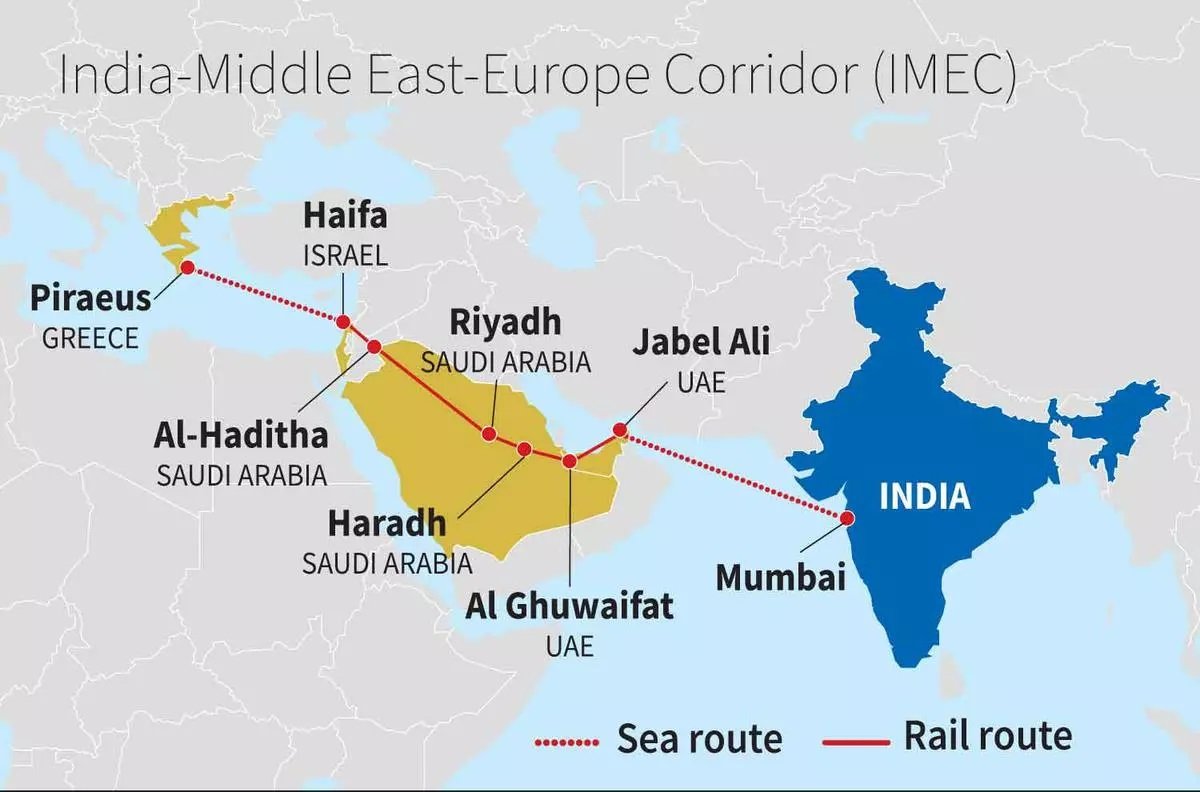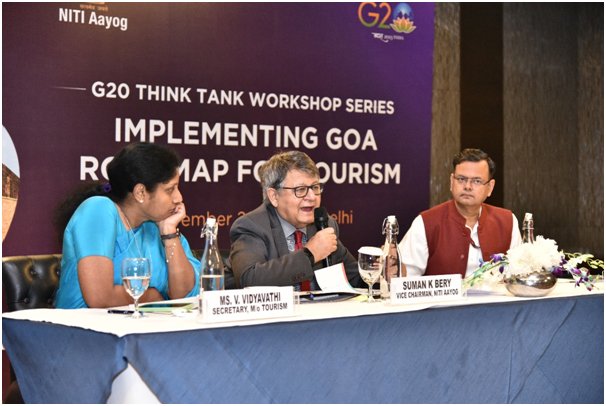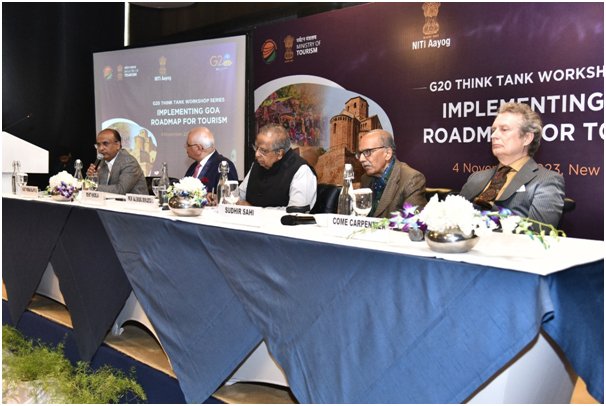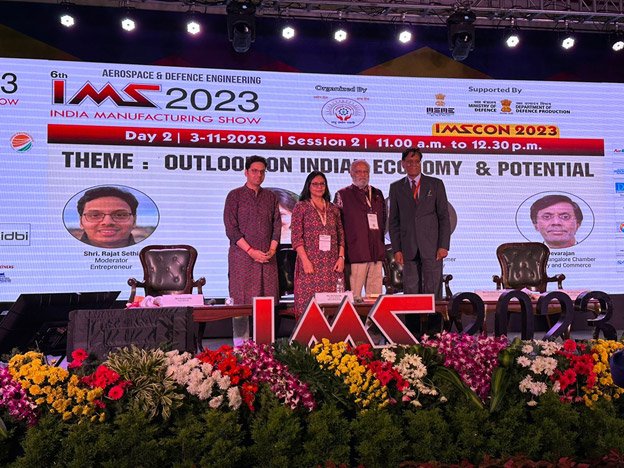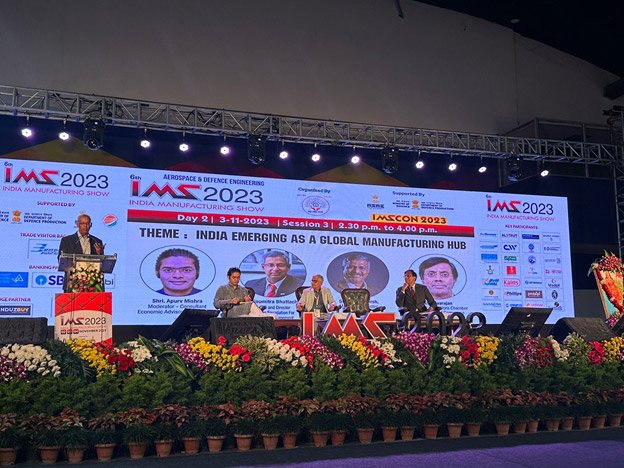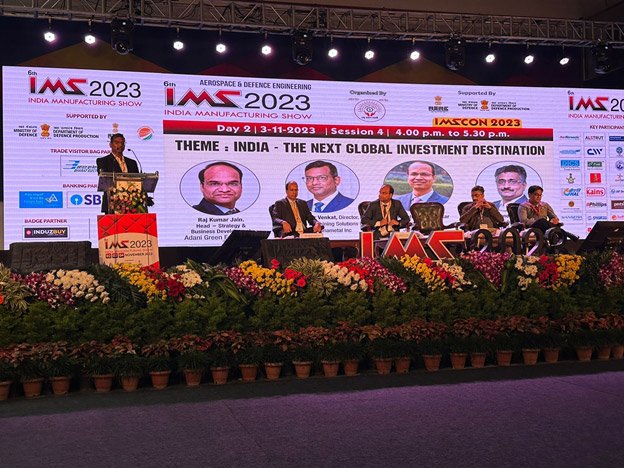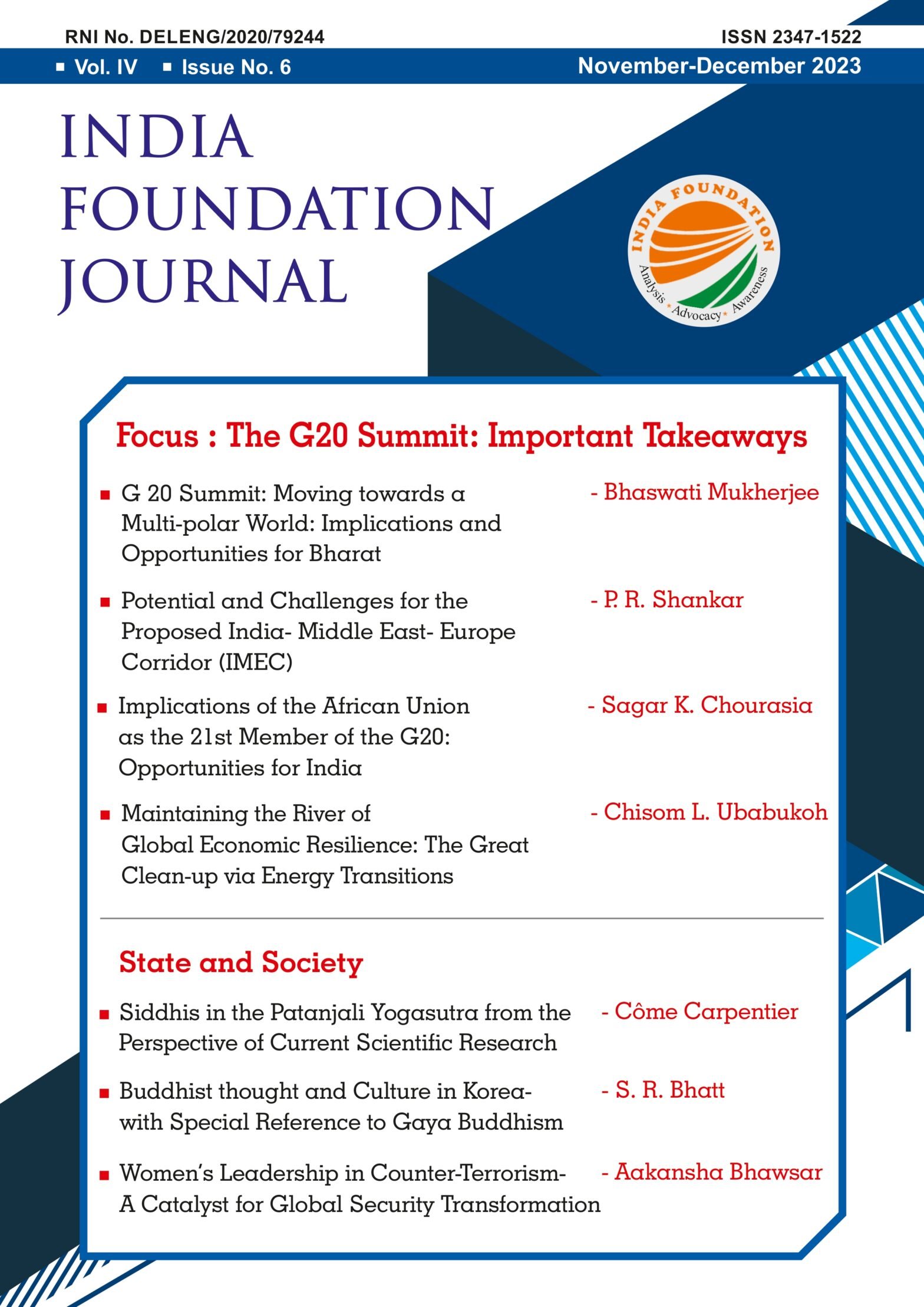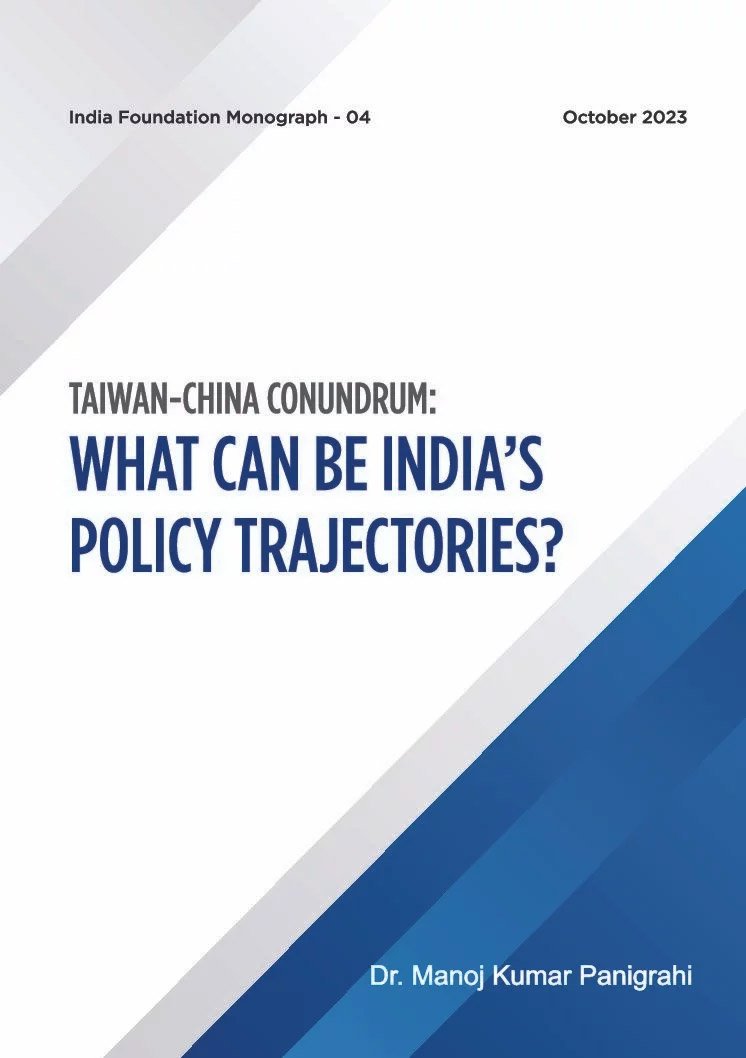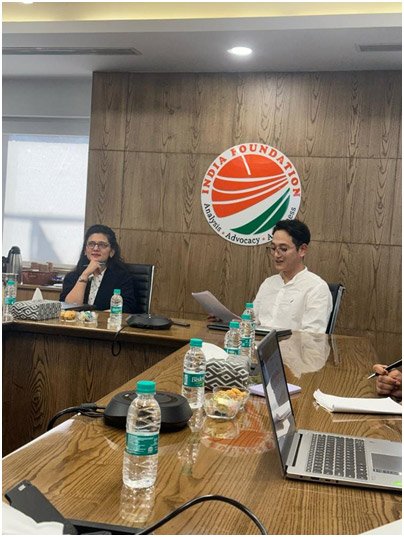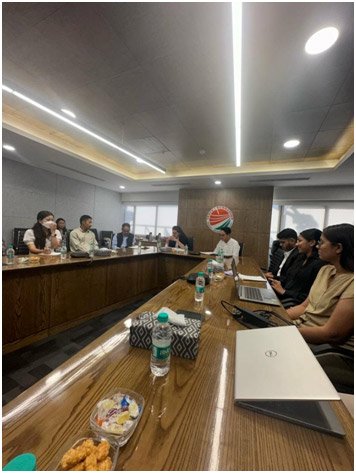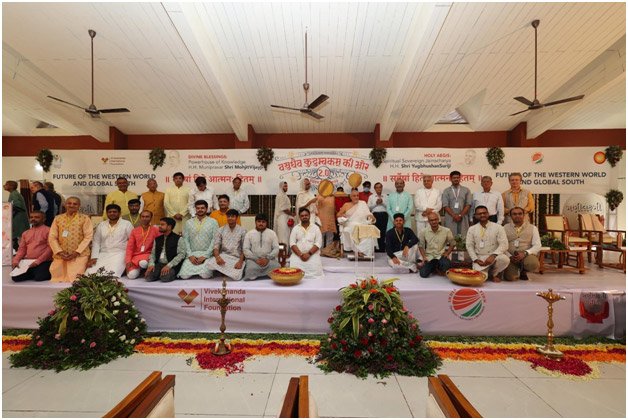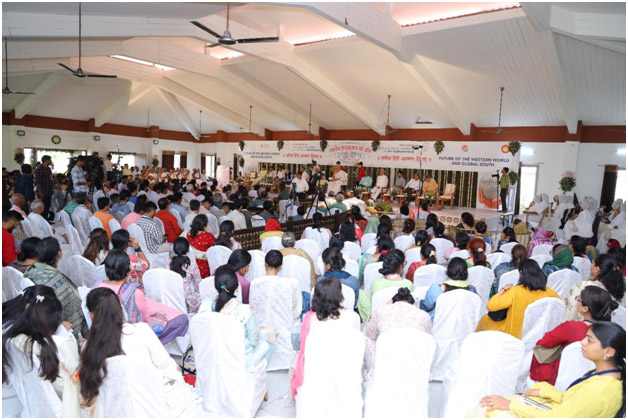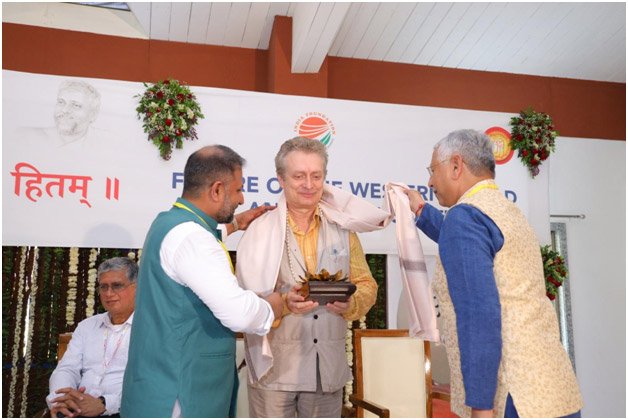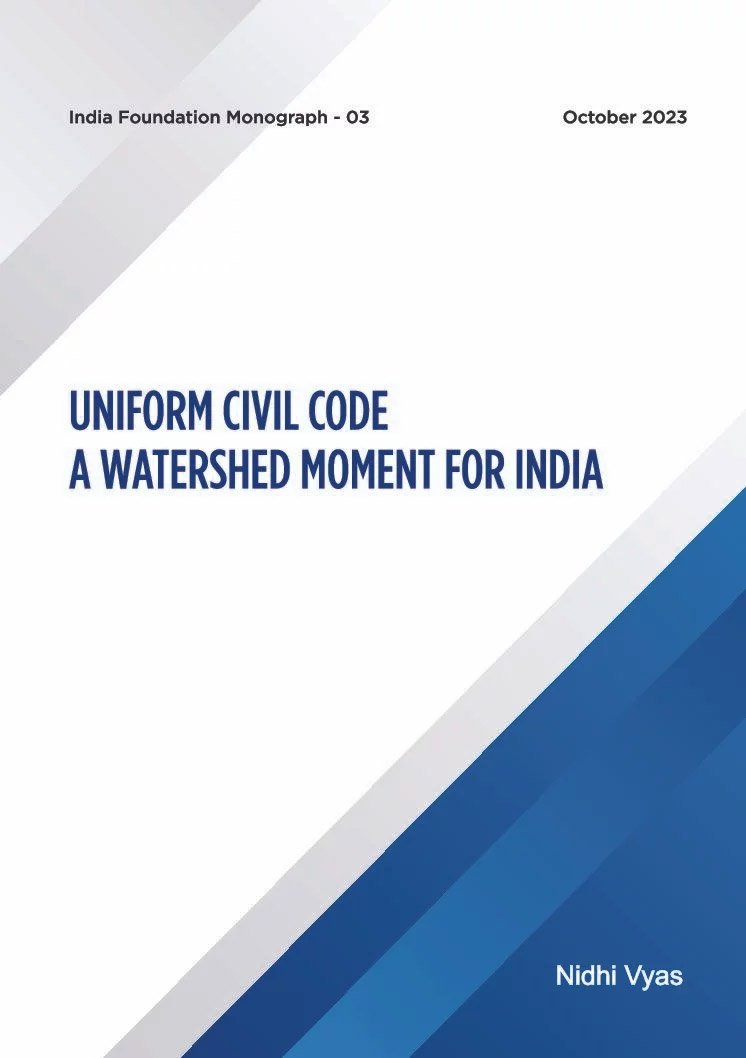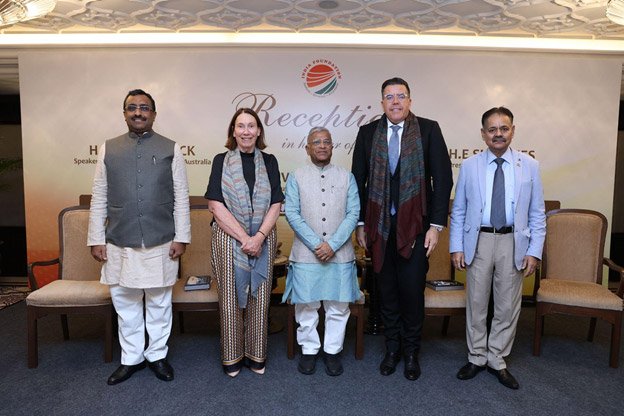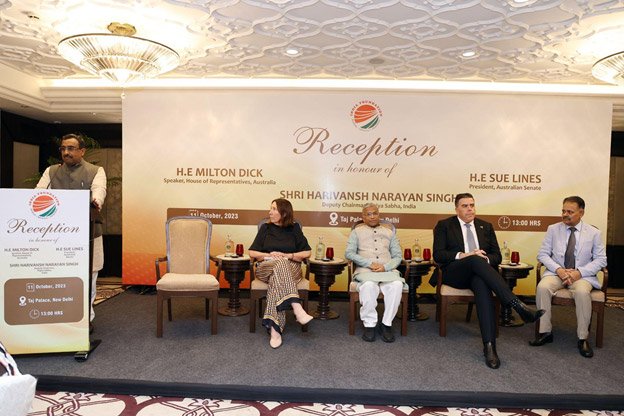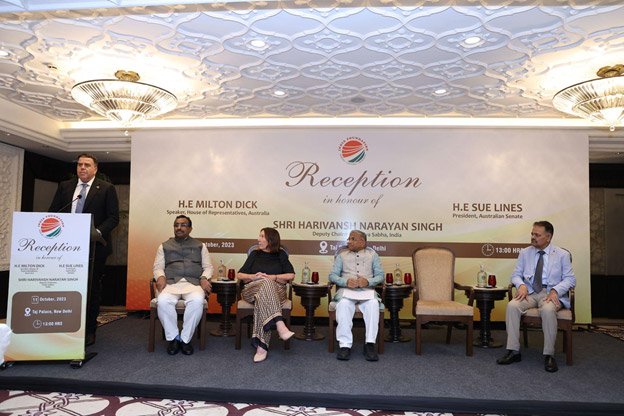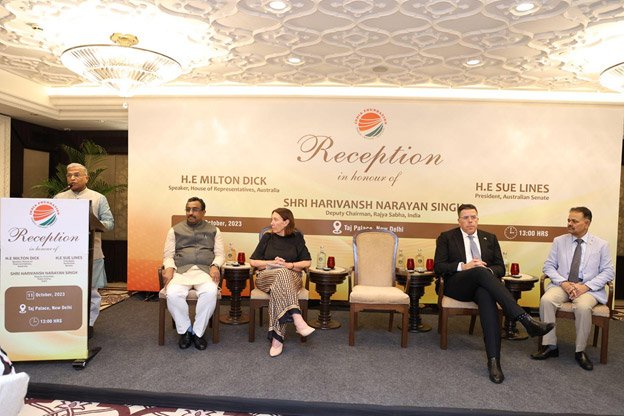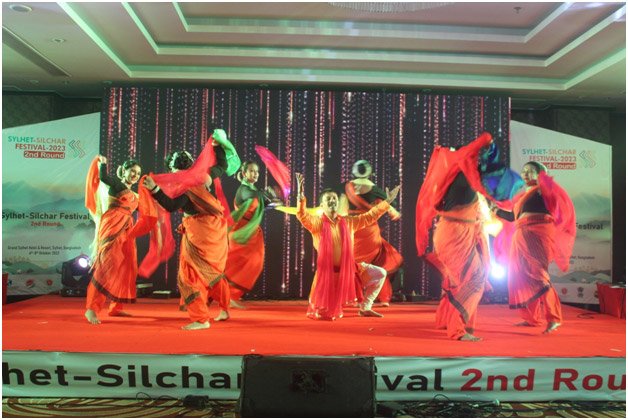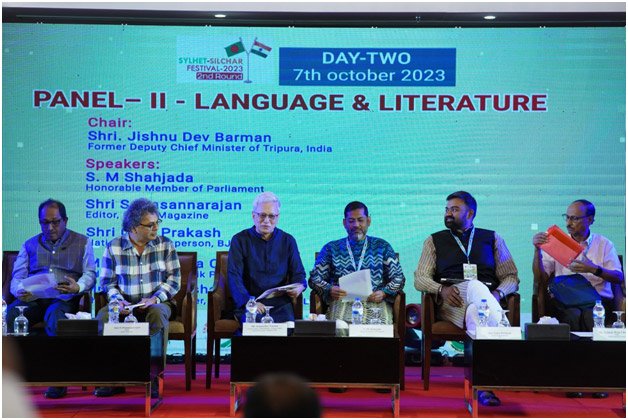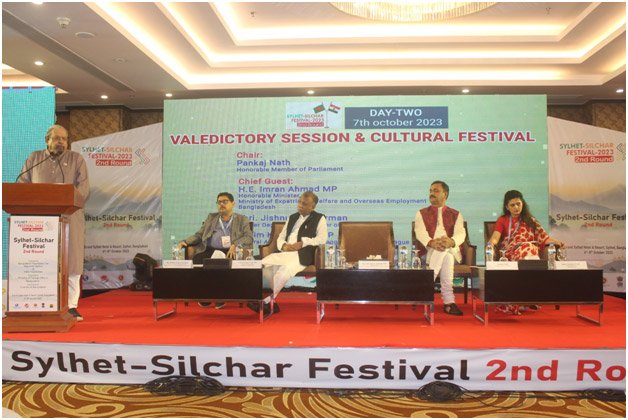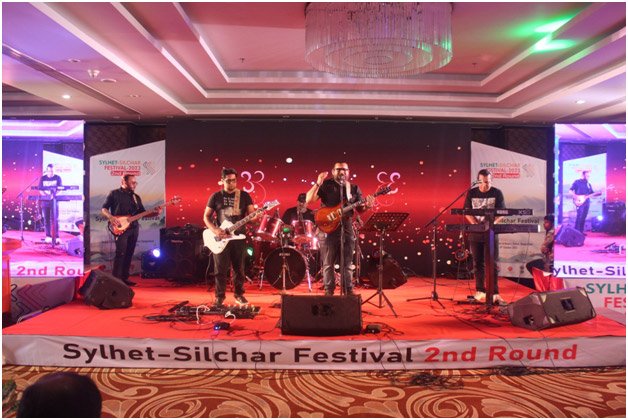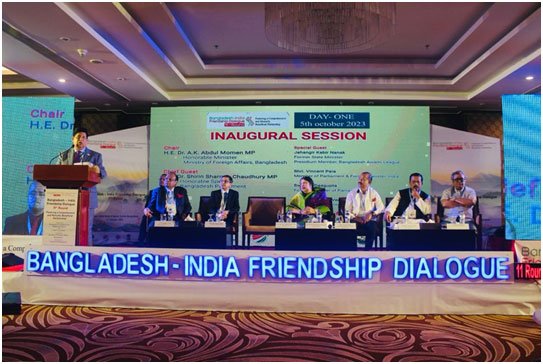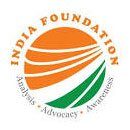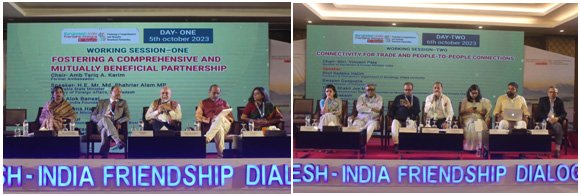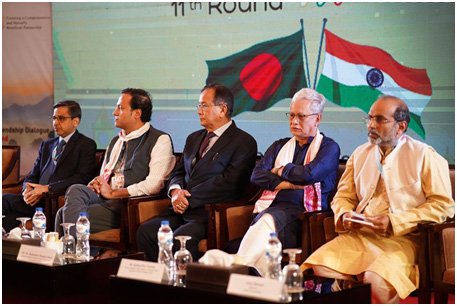Abstract
This paper focuses on the geo-economic transition of the most relevant plurilateral grouping of‘Group of 20 nations’ (G20) to G21 throughthe addition of the African Union (AU), The paperanalyses key economic aspects of Africa, the structure of the AU and identifies the frameworksthat may need to be introduced in the upcomingG21Presidencies. Further, it illustrates the need for the member countries to revisit the foundation of the forum and re-position themselves on the overall agenda to accommodate the voices from the global South. Based on these analyses, the paper seeks to identify opportunities for India and economic growthavenues for the G21,in addressing the newly added member, the AU.
Introduction
The G20 countries comprised 19 nations and the European Union with a combined 85% of the world’s GDP and representing 5% of global trade along with 60% of the world population. Among the G20 member countries, four out of six countries of the Global South will hold the Presidency of the G20 in the two consecutive Troikas of G20 Presidencies: ‘Indonesia-India-Brazil’&‘India-Brazil-South Africa’. Despite geo-political polarisation among G-20 members, countries in the global South such as India took the responsibility for a macro view of contemporary global challenges. This has allowed the G20leadership to empowerthe Global South by integrating the AU as the newest permanent member. Over the past few years, numerous crises have significantly impacted the global South, leading to low growth, higher global oil and gas prices, reduced remittances, and lower demand for products and services. Despite these challenges, global South countries are quickly ascending as key players on the international scene, with their demographic dividends contributing to providing a skilled workforce. Given these factors, the G20 promises to provide an ideal platform to bridge the voices of the global South at the plurilateral level. Although the mandate of the G20 is to foster economic growth and development,Is the G20 tilting towards a geo-political gathering as AU lacks a coherent economic consortium?
The structural efficacy of an organisation depends on the capacity of its members to come together and engage over a wide agenda. The current geopolitical tensions are hindering international negotiations on major issues such as indebtedness with global financial institutions and the inability to access more blended financing or climate financing for developing countries. The shifting balance of power has eroded the credibility and legitimacy of the Bretton Woods institutions, leading to mounting pressure on the G20 to deliver much-needed reforms.Before the G20 Bali’s leader declaration, a brief negotiationwas underway to have the AU as the permanent member, which was also promoted by US President Biden during the Africa-US Summit 2022. India’s Prime Minister Narendra Modi has suggested a “human-centric” approach, referring to the G20’s partnership in the areas of vaccine or pharmaceutical supply chain during a conflict, pandemic, or economic crisis.[1] Some initiatives like India’s G20 global partnership for financial inclusion for development in the digital economy covered 40 countries and the UN agencies, thus confirming the transformative potential of the G20 towards G21. The Global South’s consultations gained unprecedented leverage through the “Voice of Global South Summit” initiative under India’s G20 Presidency, which prioritised sustainable and inclusive global growth. Thus, G20 seemed to be one of the most relevant platforms to accommodate the voices of all global South players in stirring this plurilateral system and further creating a systemic intervention in international negotiations for the future of development. By engaging in such initiatives, the G20 global South troikas can develop a roadmap to enhance its capabilities with the AU and its regional governing institutions. This will enable the G20 to address contemporary challenges of the economic integration of AU and will be able to table potential impactful reforms that may include sustainable financing and the provision of digital public goods.
Addressing Africa: Impact assessment on G20 countries
The World Bank report of 2020 suggested that the African economy will grow to $4 trillion in 2027 with 1.7% population growth annually in the sub-Saharan African region.[2] However, the collective identity of the African continent has been heavily debated, which was first constituted at the Organisation of African Unity (OAU)where Ghana’s first President, Kwame Nkrumah’s speechquoted an iconic word for the continent, “We must unite now or perish.” In September 1999, the Sirte Declaration by the head of states of OAU called for the formation of the AU. Later, in 2002, the AU was launched as the successor of the OAU, with the vision: “An integrated, prosperous and peaceful Africa, driven by its citizens and representing a dynamic force in the global arena.” The key fundamental ideas of the AU included ‘strengthening the lack of collective Idea of Africa’, promoting democratic governance, preventing internal continental security spills out and free movement of people through a single African Passport, which is now set in the ‘Agenda 2063’.
One of the most important G20 alignments with AU would come from the institutional reform proposed by the AU in transforming the continent to deliver on the ‘Agenda 2063’. The‘Agenda 2063’ is a strategic masterplan to transform Africa with seven aspirations in the blueprint and with several flagship programs that are bound to get a push in the integration with the G20 countries. The opportunities that prevail for the G20 countries in Africa should also align with these major flagship programs of the AU, including the African Free Trade Agreement (AfFTA), Single African Air Transport Market, African Financial Institutions, Africa Outer Space Strategy, Integrated high-speed train network, Free Movement of people in Africa and Africa Passport. Some other flagship projects include the Comprehensive Agricultural Development Program, the program of infrastructural development in Africa, the African Mining Mission, and the Science and Technology Strategy for Africa. It is evident that the young AU has the fundamental structures to take the policy directives from the G20 as the G21st member. The need for the AU to align as the permanent member of the G20 plurilateral forum, resonates at both sides equally, from the African continent and the G20 member countries pavilion.
What are the priorities for the African Union with the G20 members?The foremost priority for the AU will be in the domain of trade-related issues and with its several functioning institutions, it should be able to table G20 reforms most effectively. The AU should encourage value-added trade and investment in Africa, which would take the manufacturing bases closer to the continent. Consequently, this advocacy would also break the vicious cycle of the mineral extraction from Africa and balance ‘resource nationalism’ which is prevailing in the region,[3]further enabling investment in local labourers through skill development and capacity building. The existing supply chains are no longer a cost-effective means of moving goods for the industrial process, it is now increasingly considered part of a comprehensive national security strategy for nations. Further, the AU will try to negotiate for redesigning value chains through new production units which can then be exported to another country, further creating jobs and value for products through nurturing local skill development. Along with this, an additional challenge for the global South is to overcome the Western narrative of the ‘Green Transition’ on industrialization. Africa has been arguing for ‘Blended Development’ in their green transition efforts, as they still need coal and other traditional resources to power their industrialization. In addition, another big negotiating point would be debt financing, which may require the alignment of AfDB in financing infrastructure projects and building Africa Export-Import Bank (EXIM) capacity.
What will be the avenues for the old G20 members to expand their economic horizons with the AU’s inclusion?The contours of economic partnerships in Africa have been limited to specific countries like China, France and the USA among G20 members.[4] Other countries like Japan and Germany can contribute to the economic growth story in Africa by exploring opportunities throughpreferential trade agreements with various other countries of Africa through this membership.In more technical terms, G20 countries can look for phasing out of agricultural subsidies, extending tax benefits, and duty-free access to LDC (like India’s arrangement with the LDC). The G20 members can dissect and navigate further into the regional division of Africa and coordinate accordingly with the AU. East Africa and Southern Africa are relatively stable in terms of peace and security, while East Africa is economically well integrated with its own customs union.[5]Further, some regions are more integrated in terms of the ‘movement of people’, which is important for regional trade, as the free or easier passage of working professionals can enhance the productivity of development projects. These variabilities of the African economic regions would prompt the G20 countries to take a hybrid approach in navigating negotiations with the AU.
Will AU inclusion into G20 be able to re-ignite Pan-Africanism?
The AU consisting of 55 member countries possess a diversified portfolio of economies. These economies vary in economic sizes, economic stability, socio-economic and cultural diversity with 2000+ languages, and variable regional integration levels with other member countries. A big challenge to regional economic integration is the current intra-African trade which is the lowest at 18 per cent as compared to any region globally with Intra-Europe at 50 per cent and Intra-Asia trade at 69 per cent.[6] The major cause of delays in intra-trade is the lack of common standards within the African countries. There have been initiatives by the AU to tackle this challenge through the AfCFTA marketplace to promote intra-Africa trade.[7]Through G20 participation, the AU can craft its intra-regional value chains, which can help the region in tacklingcritical global challenges like climate change, food security, etc.This G20-ledeconomic integration of the continent may further harmonize the trade restrictions including non-tariff barriers, and customs and may further reignite Pan-Africanism. Further, the economic integration would also provide the required strategic neutrality for the African countries against the unilateral debt traps of any specific country.
What are some other factors that hinder the development of Pan-Africanism? Is it the politics, internal regional security architecture, lack of international standards for corporate governance, or a lack of cultural binding with a sense of unity in the continent?To achieve real cohesion across the AU members, periodic and participative exchanges are needed within the African Union.Some key initiatives by the AU to create a collective identity include the Single Payment System, Single Transport Air System and Great Green Wall Initiative, which could also further align with the G20 working frameworks. In the executive council of the AU, the Permanent Representative Committee (PRC) is responsible for trade, multilateral cooperation, and structural reforms of the AU, which may convene to align itself with the following working groups of the G20 to pacify further integration. The Congruence of the African Union Summit with the G20 summits is another synchronisation of their key structures, functions, powers, and regulations, that the countries will look to achieve in the G21 and the AU Presidencies.
Frameworks for the G21 countries: Opportunities for India
India through leading the global South has a huge opportunity to access the AU market of $ 3 trillion and tap into the next decade of a billion working class population. India can provide various capacity-building measures and knowledge-sharing ecosystems to trainthe younger generation and provide the opportunity for a demographic dividend in Africa. In such initiatives, India can lead andput the resources into the unaddressed development agenda with the other G20 economies. The G20’s various channels would provide ‘periodic conferences’ to secure the momentum of the transformation and the value of consulting each other to discuss matters of interest, which would pave the way for the inclusion of the AU. Apart from this, India can also seek to have a collective pitch with the AU to the other G21 members for a more concrete development agenda in which preferential treatment will be given to the Global South countries if they are disproportionately affected by global crises. This partnership of India with the AU as the G21st member would enhance the bargaining power with the global North bloc, which other forums like the G77 lack. This would urgently address the need for critical supplies and support during climate change, health pandemics or armed conflicts. Consequently, building a mechanism to raise funds for development projects collectively and support during critical junctures of global crises of climate change, health pandemics or even armed conflicts.Under the G21 Brazil Presidency, the AU shall look to incorporate its agenda at various levels including G21 leaders’ level, track 1 ministerial level, and track 2 diplomatic meetings along with various engagement groups of the G20 to draw on the successes of the restructured G20 forum. Alternatively, the G20 countries would also promiseaspirations for the young African Union to gain Africa’s trust in this plurilateral system.The framework below explores the integration level of the AU through a breakdown analysis of the G20 structure into G20 leaders’ level, G20 Track 1 & Track 2 level and G20 engagement groups.
The G21 leaders track will need to embrace participative diplomacy to mobilise momentum in the negotiations and make sure the changes they champion are more representative of the international community through an inclusive approach for the global South countries.The recent global crises have pivoted the merging of critical socio-economic issues with national security concerns of the major powers and emerging economies, as observed in sectors like supply chains, energy transition, climate change, health and food security. The stride to involvemore stakeholders will help increase the legitimacy of the plurilateral reform process and allow every country to provide input and steer institutional changes.
Will AU’s inclusion of the G20 rescue the African countries from debt distress? Can India play a role in the debt restructuring of African countries with the World Bank and IMF?In track 1 and track 2 alignments, the Sherpa track can sync with the African Peer Review Mechanism used by the African States to monitor their governance performance into four themes: political governance, economic governance, cooperate governance and socio-economic development. Other development meetings at the ministerial levels like the trade ministerial and finance ministerial track shall also be moderated by additional agencies like the African Union Development Agency (AUDA-NEPAD), which wasobserved at G20 meetings. AUDA-NEPAD is responsible for regional integration African trade, and natural resource governance (energy security and food security). The G20 Finance track has also parallel initiatives that include International Financial Architecture (IFA), Infrastructure Working Group, and Sustainable Finance Working Group. Global Partnership for Financial Inclusion, and International Taxation Agenda that will require synchronisation with the following AU financial institutions:
- The African Central Bank(ACB)is focussed on African economic integration building a common monetary policy, promoting exchange rates stability, foreign exchange restrictions and single African currency. Whereas the African Investment Bank promotes economic growth and integration by mobilising resources from the private and public sectors towards the development of the African continent. The G20 can foster more stable frameworks for mobilising resources in and out of the capital market of the African continent. Further, G20 can provide technical assistance to AU countries to bolster the execution of their investment.
- African Monetary Fund provides greater monetary integration by eliminating trade restrictions and coordinating monetary policies for member countries which should integrate with the financial track of the G20 countries.
- What kind of capital infusion can happen within the AfDB?The African Development Bank (AfDB) is a part of the AU that is trying to scale up the investment uniformly across Africa. The AfDB has mobilised $5 billion in trade in 2021 and focuses on infrastructure development, enhancing its intra-regional trade. AfDB is focusing on achieving a single market in Africa that would offer a huge customer base market and opportunities for companies allowing economies of scale. It also forms agreements with other countries and receives funding from its partnered organizations. The IMF-World Bank’s first annual meeting in over 50 years has helped raise the debt ceiling for African countries.[8] Within the G21 forum, the AfDB countries and the African Investment Bank would get an avenue with these global financial institutions to work on HIPC initiatives[9]to further present a strong case and negotiate debt relief in the African region.
- African Security Exchange Associationcan help navigate through integrating financial markets of the African countries. Thesix major countries of the region control $ 1 trillion in assets that majorly including Nigeria, South Africa, Morocco, and Kenya. Africa’s deeper capital markets will help the region to mobilize the capital to support infrastructure development, which can be partially achieved by syncing with the finance track of the G20 countries. There are multiple interventions needed to work in a consolidated framework for the cross-border payment systems which will benefit from the G20 finance track.
To get a comprehensive socio-cultural integration of the AU, theofficial G20 Engagement Group including the Business20, Think20, Women20, and Civil20 can further align the resonating institutions which deal with the judicial, human rights and socialorgans of the AU. In this, some of the main bodies include the African Commission on Human and Peoples’ Rights, the AU Commission on International Law (AUCIL) and others. The work of these treaties is guided by the African Charter on Human and People’s Rights, and the African Charteron the Rights Welfareof the Child. Other institutional initiatives like the ‘Affirmative Financial Action for Women’ by AfDB can align with the Women20 engagement group to blend with the G20 platform.The Startup20 engagement group was introduced under India’s G20 Presidency, which will be carriedforward during the Brazil G20 Presidency. The three major challenges that are barriers to entry for businesses in Africa are access to finance, access to energy/power, regional political stability, and lack of big data centres which results lack of a conducive environment for digital businesses to build their ecosystems, which now can be advocated by other G21 members through the Startup20.
Table 1: Analysingthe Impact of the AU as the G21st member.
India’s G20 Presidency in 2023 has been a pivot point inintegratingthe global South in the aftermath of the COVID-19 pandemic through the AU permanent membership, with the added benefit of steering the process for two consecutive Global South troikas.
| Africa’s and AU’s Challenge | G20 integration level | India’s Opportunity | Specific recommendations |
| 1. Structural alignment
For plurilateral changes to be acceptable, it has become clear to all G20 countries that breaking the status quo will be more beneficial to them than maintaining it. For these changes to become acceptable to all G21 members, major economies need to share theireconomic prowess with the newmembers. |
G20 Leaders level
|
India as a champion of global South causes can lead the structural alignment of the AU and help the global South leaders maintain their
interest in plurilateral solutions. |
Establishing G20-led channelsinside the AU for managing aspirations among African states, with a focus on the Global South. This can further coordinate with the G20-G7 leader level to combineefforts. |
| 2. Development Agenda
Periodic conferences for the AU with the global North:Under the aegis of Brazil’s G20 presidency, regular meetingswith Track 1 and Track 2 will align interestsand reaffirm the trust in the plurilateral forums for the global South. |
G20 Sherpa Track and Ministerial Track:Finance and Trade Ministers
|
More global-aligned financing for development.Addressing the lack of integration of global South issues in the development agendaduring a global crisis. | A more binding and formal participation wouldestablish the idea of facilitating a shared understanding among G20 and Global South countries and providing a platform for promoting a shared development agenda. |
| 3. Socio-cultural Integration
Participative conferences and meetingsdo not leave anyone, nor any issues, behind. Addressing various issues including water security, gender equality, food security, and support for emerging start-ups. |
G20’ official Engagement Groups [B20, T20, C20, W20, Y20, S20, Startup20] | India can act as an enabler for the socio-cultural integration of the Global South to access critical economic solutions as they are most vulnerable during a crisis. | This would be a more informal participationwhere various groupings will be informing the leadership about the suggested mechanism. |
Conclusion
The G20 India in consultation with the Global South countries provided the perfect platform to generate a permanent presence of AU, which allows G20 to be more representative of the international community. In the contemporary G20 and AU systems, some concrete mechanisms for the G20 can shape and support a reformed and more representative plurilateral arena for accommodating the voices of the global South can create opportunities for India.The AU can integrate G21 reforms and implement the binding resolutions taken in future G21 summits.The G21will now provide the platform to meetglobal South countries regularly to prevent negotiations from stalling. If these meetings are scheduled regularly, country leaders will be able to build trust and relationships with one another, in turn incentivising them to embrace the AU processes rather than relying on backdoor covert diplomacy or avoiding negotiations altogether. This will help the G20 forum to maintain a functional relationship between the G20-Global South members, which then can act during targeted economic sanctions, recommend the inclusion of non-traditional security issues of the Global South, and even negotiate for financial aid during humanitarian crises for LDCs.
The G20 needsthe AU as much as the AU needs the G20. This movement of integrating AU within G20 could end perpetual warfare in Africa, as well as give birth to a new era of development and cooperation through participating in the plurilateral forum. For African leaders, this could be the time for embracing references to a moral equilibrium which repelled hegemonic and revisionist ambitions, as this plurilateral platform would have a succession of meetings, congresses, and informal talks, where leaders are consulting each other in their common endeavour to build a system of tranquillity. Similarly, G20 leaders, together with countries of the Global South, will be able to align their respective agendas on a reform of the plurilateral system if they all achieve and promote a common understanding among countries. These foundations of several innovations and learning processes through the integration todaycan serve as the basis for the global South reforms for International Organisations such as the United Nations in the future.
Author Brief Bio: Sagar K. Chourasia is Associate fellow, Centre for Economy, and Growth, ORF.
References:
[1] “PM Modi Bats for Human-Centric Globalisation at Voice of Global South Summit,” The Times of India. January 13, 2023. https://timesofindia.indiatimes.com/india/pm-modi-bats-for-human-centric-globalisation-at-voice-of-global-south-summit/articleshow/96971066.cms.
[2] “Africa: Real GDP Grown Rate 2010-2027 | Statista.” 2023. Statista. April 28, 2023.https://www.statista.com/statistics/1300818/real-gdp-growth-rate-in-africa/.
[3] Sguazzin, Antony. 2023. “Next Africa: Resource Nationalism or a Fair Share?” Bloomberg.Com, June 20, 2023. https://www.bloomberg.com/news/newsletters/2023-06-20/next-africa-resource-nationalism-or-a-fair-share.
[4] “External Partnerships between the AU and Organisations, Regions or Countries | African Union.” n.d. https://au.int/en/partnerships.
[5] “African Continental Integration: Lessons from East Africa.” 2022. The Growth Lab. October 6, 2022. https://growthlab.hks.harvard.edu/blog/african-continental-integration-lessons-east-africa.
[6] “The Economic Significance of Intra-African Trade—Getting the Narrative Right | Brookings.” 2022. Brookings. August 16, 2022. https://www.brookings.edu/articles/the-economic-significance-of-intra-african-trade-getting-the-narrative-right/.
[7] “IATF – Intra-African Trade Fair 2023.” n.d. IATF. https://www.intrafricantradefair.com/en.
[8] Reuters. 2023. “IMF-World Bank Meetings: Which Developing Countries Face Debt Crisis?” Reuters, October 6, 2023. https://www.reuters.com/markets/developing-countries-facing-debt-crunch-2023-10-04/.
[9] “Debt Relief under the Heavily Indebted Poor Countries Initiative.” 2023. IMF. February 3, 2023. https://www.imf.org/en/About/Factsheets/Sheets/2023/Debt-relief-under-the-heavily-indebted-poor-countries-initiative-HIPC.


